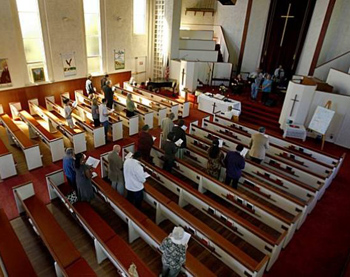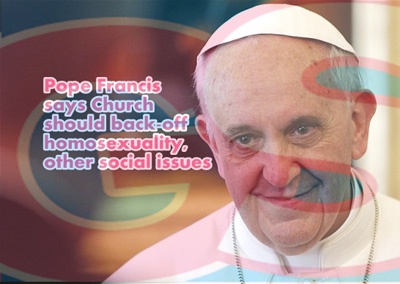Consequences of Vatican II
 |
 |
 |
 |
 |
 |
 |
The Failure of the Medicine of Mercy
For nearly two millennia, prior to Vatican Council II, the Popes of the Catholic Church successfully used condemnations and anathemas as an effective method to combat heresy and sin.
Nevertheless, John XXIII, in his opening speech to the Council announced condemnations and anathemas would no longer be used to combat error since “the imposition of rules is not liked these days.” The Pope further declared, “today she (the Church) prefers to make use of the medicine of mercy, rather than the strong arms of severity.” He went on to add the Church resists error “by showing the validity of her teaching, rather than by issuing condemnations.”(1)
John Paul II’s catechism enshrined this new attitude toward sin by removing the “Admonishing of Sinners” from the list of the Spiritual Works of Mercy. (2) John XXIII's reason for excluding condemnations and anathemas led to the Council’s acknowledgement of the new and overriding importance of the role man should have in deciding how he should save his eternal soul.
Even though Christ will be the ultimate judge of the fate of the souls of men, John Paul II’s action seems to affirm that man will tell Christ what standards of judgment He must use.
An escalating disaster for souls
This new attitude toward sin has been an utter disaster for the eternal welfare of millions of souls since it has provided a “cover,” or a rationale, for the Church to no longer urge the faithful to fight against sins that truly endanger the eternal welfare of their souls.
 As evidence, abortion and same-sex "marriage" have been legalized in many countries throughout the world, favoring their number to sky-rock.
As evidence, abortion and same-sex "marriage" have been legalized in many countries throughout the world, favoring their number to sky-rock.
Another consequence: the number of Catholics now fulfilling their obligation of attending Mass on Sundays and Holy Days of Obligation has diminished incredibly, as well as their presence at traditional devotions such as prayer vigils, the Stations of the Cross, the Forty Hours Devotion, the Rosary Hour, and others that assist in the salvation of the eternal soul.
In his book Index of Leading Catholic Indicators, The Church since Vatican Council II, K. C. Jones shows the tremendous abandonment of Catholics from the Catholic Faith since the Council up to the year 2000. Sadly, since that year, the situation has continued to deteriorate. Therefore, everything induces one to surmise that policies based on the ‘medicine of mercy’ to be imposed by Pope Francis will escalate the deterioration. The following paragraphs provide some evidence in support of that allegation.
Francis: Ignoring sin and the salvation of souls
In his October 1, 2013, interview by Antonio Scalari, when commenting on the sins of sodomy and abortion, Pope Francis omitted to denounce that these sins put souls in extreme danger of eternal damnation, since the Church teaches they are sins that cry out to heaven for vengeance.
His words were that the Catholic Church must “shake off her obsession with teachings on abortion, contraception and homosexuality” and become more merciful or risk the collapse of her entire moral edifice "like a house of cards."
The Pope’s response was such as to enable those who promote these sins. All in all, his responses to Scalari were overwhelmingly concerned with the plight of the poor and the needy with no mention of a concern for the salvation of souls, the very purpose for which Christ established the Church.
 In fact, the Ten Commandments are clear and explicit declarations – even though the conciliar Church clergy frequently derogatorily refer to them as a “laundry list of laws.” The Pope’s statement, “if the Christian is a restorationist, a legalist, if he wants everything clear and safe, then he will find nothing,” is actually a “put down” of the Ten Commandments and of Christ who said: “If you love me keep my commandments.”
In fact, the Ten Commandments are clear and explicit declarations – even though the conciliar Church clergy frequently derogatorily refer to them as a “laundry list of laws.” The Pope’s statement, “if the Christian is a restorationist, a legalist, if he wants everything clear and safe, then he will find nothing,” is actually a “put down” of the Ten Commandments and of Christ who said: “If you love me keep my commandments.”
In other speeches or interviews, Pope Francis has also stressed the importance of the need to care for the poor and the needy while neglecting to place equal or more importance on the need to avoid sin in order to save one’s eternal soul. The words of the Gospel relating to Christ’s endorsement of Mary Magdalene’s action of anointing His feet with an ointment of great price, show the overriding importance of glorifying Christ and obeying His teachings, rather than making the top priority caring for the poor and needy. (Mt 26, 6-13; Mk 14, 3-9, Jn 12, 1-8)
Pope Francis has also asserted that the fruits of Vatican II are enormous: “Just recall the liturgy.” Early in his pontificate, John XXIII gave a criterion for determining the vitality of a Church movement. When informed of a new Church movement, the Pope would say: The infallible mark of the vitality of a Church movement is the increase in the numbers of priestly and religious vocations. (3)
Applying John XXIII’s criterion to the Novus Ordo Missae with its meal liturgy, one is forced to conclude it was a disaster, particularly for the eternal salvation of the souls. Indeed, a vast quantity of priests, religious and laymen left the Church as a consequence of the imposition of the Novus Ordo. A mere 15 years after that imposition, the catastrophic effects were so obvious that John Paul II in 1980 felt obliged to make a public apology for the liturgical revolution in his Apostolic Letter Dominice cenae.
 Pope Francis only added to that liturgical revolution by celebrating a Mass at the World Youth Day (WYD) 2013 in Rio de Janeiro in rock concert style. That Mass was an insult to Jesus not only for such acts, but also for the irreverent distribution of the Sacred Hosts in disposable plastic cups.
Pope Francis only added to that liturgical revolution by celebrating a Mass at the World Youth Day (WYD) 2013 in Rio de Janeiro in rock concert style. That Mass was an insult to Jesus not only for such acts, but also for the irreverent distribution of the Sacred Hosts in disposable plastic cups.
Pope Francis also said: “The Church has sometimes locked itself up in small things, in small minded rules.” Since the Ten Commandments are a clear and specific set of statements (rules), the Pope’s words certainly do not conform to how Christ said we should love Him. Indeed, Christ said: “If you love me keep my commandments.” (Jn 14: 15)
The Pope’s statement, when combined with his remarks on abortion and homosexuality, give the strong impression the Church has been overly concerned with these grave sins in the past.
The conciliar Church, however, most certainly has not been overly concerned with the terrible effect of such sins on the eternal salvation of the souls. It has encouraged sex education programs in the lower schools, which are known to encourage sexually sinful behavior. It rarely, if ever, speaks out or takes actions against such sins in Catholic colleges and universities and even promotes the existence of "gay" student organizations and pro-abortion and pro-sodomy speakers.
Further, when it does speak about a grave sexual sin by a particular individual, the conciliar Church stresses one must have compassion on the individual, instead of instructing him to consider the terrible impact of that sin on his soul.
One example of the conciliar Church’s response to a grave public sin was its reaction to the well-publicized sexual trysts between a former president [Clinton] and a young woman intern. Throughout the country, many sermons preached in the conciliar Church stressed the need for forgiveness and compassion for the president, with next to nothing said about the effect of the sin on the eternal salvation of the souls of the president or the intern.
One could say, however, that in an extremely perverse way, the Pope’s words are true since for several decades the Bishops and the Hierarchy of the Conciliar Church have been implicitly encouraging the sins of sodomy and pedophilia among the clergy by their persistently devious and very costly attempts to cover up such terrible sinning.
In conclusion, the conciliar Popes’ notion that the medicine of mercy consists in watering down the teachings of Christ and making them more acceptable to man severely cripples a man’s ability to resist sin and thus truly endangers the eternal salvation of his soul. Thus, this new attitude is anything but merciful. True mercy is what enables man to save his soul and fully accords with Christ’s words: “Seek ye first the kingdom of God and His justice; and all these things shall be added unto you.” (Mt. 6:33)

Posted October 14, 2013
Nevertheless, John XXIII, in his opening speech to the Council announced condemnations and anathemas would no longer be used to combat error since “the imposition of rules is not liked these days.” The Pope further declared, “today she (the Church) prefers to make use of the medicine of mercy, rather than the strong arms of severity.” He went on to add the Church resists error “by showing the validity of her teaching, rather than by issuing condemnations.”(1)
John Paul II’s catechism enshrined this new attitude toward sin by removing the “Admonishing of Sinners” from the list of the Spiritual Works of Mercy. (2) John XXIII's reason for excluding condemnations and anathemas led to the Council’s acknowledgement of the new and overriding importance of the role man should have in deciding how he should save his eternal soul.
Even though Christ will be the ultimate judge of the fate of the souls of men, John Paul II’s action seems to affirm that man will tell Christ what standards of judgment He must use.
An escalating disaster for souls
This new attitude toward sin has been an utter disaster for the eternal welfare of millions of souls since it has provided a “cover,” or a rationale, for the Church to no longer urge the faithful to fight against sins that truly endanger the eternal welfare of their souls.

Fruits of the Novus Ordo: empty churches at Sunday Mass
Another consequence: the number of Catholics now fulfilling their obligation of attending Mass on Sundays and Holy Days of Obligation has diminished incredibly, as well as their presence at traditional devotions such as prayer vigils, the Stations of the Cross, the Forty Hours Devotion, the Rosary Hour, and others that assist in the salvation of the eternal soul.
In his book Index of Leading Catholic Indicators, The Church since Vatican Council II, K. C. Jones shows the tremendous abandonment of Catholics from the Catholic Faith since the Council up to the year 2000. Sadly, since that year, the situation has continued to deteriorate. Therefore, everything induces one to surmise that policies based on the ‘medicine of mercy’ to be imposed by Pope Francis will escalate the deterioration. The following paragraphs provide some evidence in support of that allegation.
Francis: Ignoring sin and the salvation of souls
In his October 1, 2013, interview by Antonio Scalari, when commenting on the sins of sodomy and abortion, Pope Francis omitted to denounce that these sins put souls in extreme danger of eternal damnation, since the Church teaches they are sins that cry out to heaven for vengeance.
His words were that the Catholic Church must “shake off her obsession with teachings on abortion, contraception and homosexuality” and become more merciful or risk the collapse of her entire moral edifice "like a house of cards."
The Pope’s response was such as to enable those who promote these sins. All in all, his responses to Scalari were overwhelmingly concerned with the plight of the poor and the needy with no mention of a concern for the salvation of souls, the very purpose for which Christ established the Church.

In other speeches or interviews, Pope Francis has also stressed the importance of the need to care for the poor and the needy while neglecting to place equal or more importance on the need to avoid sin in order to save one’s eternal soul. The words of the Gospel relating to Christ’s endorsement of Mary Magdalene’s action of anointing His feet with an ointment of great price, show the overriding importance of glorifying Christ and obeying His teachings, rather than making the top priority caring for the poor and needy. (Mt 26, 6-13; Mk 14, 3-9, Jn 12, 1-8)
Pope Francis has also asserted that the fruits of Vatican II are enormous: “Just recall the liturgy.” Early in his pontificate, John XXIII gave a criterion for determining the vitality of a Church movement. When informed of a new Church movement, the Pope would say: The infallible mark of the vitality of a Church movement is the increase in the numbers of priestly and religious vocations. (3)
Applying John XXIII’s criterion to the Novus Ordo Missae with its meal liturgy, one is forced to conclude it was a disaster, particularly for the eternal salvation of the souls. Indeed, a vast quantity of priests, religious and laymen left the Church as a consequence of the imposition of the Novus Ordo. A mere 15 years after that imposition, the catastrophic effects were so obvious that John Paul II in 1980 felt obliged to make a public apology for the liturgical revolution in his Apostolic Letter Dominice cenae.

Communion distributed irreverently from plastic paper cups at the Rio WYD
Pope Francis also said: “The Church has sometimes locked itself up in small things, in small minded rules.” Since the Ten Commandments are a clear and specific set of statements (rules), the Pope’s words certainly do not conform to how Christ said we should love Him. Indeed, Christ said: “If you love me keep my commandments.” (Jn 14: 15)
The Pope’s statement, when combined with his remarks on abortion and homosexuality, give the strong impression the Church has been overly concerned with these grave sins in the past.
The conciliar Church, however, most certainly has not been overly concerned with the terrible effect of such sins on the eternal salvation of the souls. It has encouraged sex education programs in the lower schools, which are known to encourage sexually sinful behavior. It rarely, if ever, speaks out or takes actions against such sins in Catholic colleges and universities and even promotes the existence of "gay" student organizations and pro-abortion and pro-sodomy speakers.
Further, when it does speak about a grave sexual sin by a particular individual, the conciliar Church stresses one must have compassion on the individual, instead of instructing him to consider the terrible impact of that sin on his soul.
One example of the conciliar Church’s response to a grave public sin was its reaction to the well-publicized sexual trysts between a former president [Clinton] and a young woman intern. Throughout the country, many sermons preached in the conciliar Church stressed the need for forgiveness and compassion for the president, with next to nothing said about the effect of the sin on the eternal salvation of the souls of the president or the intern.
One could say, however, that in an extremely perverse way, the Pope’s words are true since for several decades the Bishops and the Hierarchy of the Conciliar Church have been implicitly encouraging the sins of sodomy and pedophilia among the clergy by their persistently devious and very costly attempts to cover up such terrible sinning.
In conclusion, the conciliar Popes’ notion that the medicine of mercy consists in watering down the teachings of Christ and making them more acceptable to man severely cripples a man’s ability to resist sin and thus truly endangers the eternal salvation of his soul. Thus, this new attitude is anything but merciful. True mercy is what enables man to save his soul and fully accords with Christ’s words: “Seek ye first the kingdom of God and His justice; and all these things shall be added unto you.” (Mt. 6:33)
- Romano Amerio, Iota Unum, p. 80
- See item #2447 in the catechism
- CRC, No. 227, English Edition, March 1990, p. 17

Posted October 14, 2013
______________________
______________________








